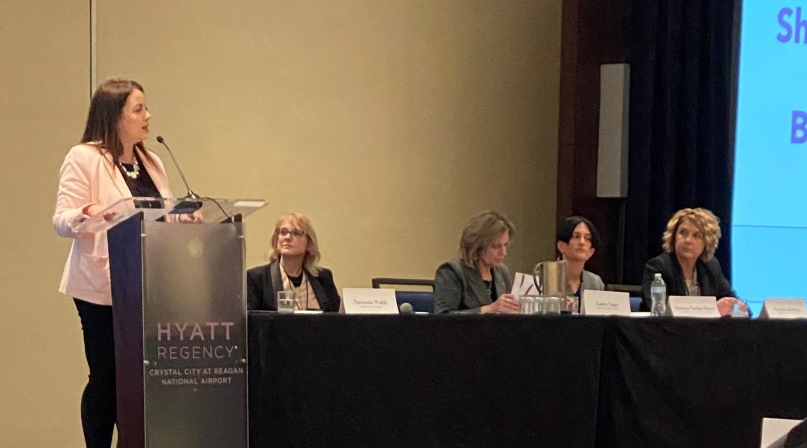Counties Build Bridges to Opioid Use Disorder Treatment
Upcoming Events
Related News

Opioid misuse continues to pose a challenge for county justice and health departments, with 130 Americans dying of opioid overdose daily. The Department of Justice’s Bureau of Justice Assistance (BJA) and Arnold Ventures (AV) – both key NACo partners on criminal justice issues – partnered to create the Planning Initiative to Build Bridges Between Jail and Community-Based Treatment for Opioid Use Disorder, or Building Bridges initiative, as a demonstration project under BJA’s Comprehensive Opioid Abuse Program (COAP). The first phase of the Building Bridges initiative provided 16 counties and parishes from across the country with technical assistance and guidance from subject matter experts for nine months to create a comprehensive continuum of care model for justice-involved individuals with opioid use disorders that focuses on building bridges between in-custody and community-based treatment and supervision, including probation, parole and court-based programs. The second phase, a collaboration between BJA and the Centers for Disease Control and Prevention, will support sites in enhancing reentry and prevention efforts. These sites are led by interdisciplinary teams made up of county stakeholders from justice and health agencies including jails, probation and parole offices, public health departments and community-based treatment providers.
In January 2020, BJA and AV co-sponsored the second convening in a series of learning opportunities for the Building Bridges sites in Arlington, Va. The teams presented updates on their opioid use disorder treatment initiatives, discussed implementation barriers and solutions and participated in conversations on ways to improve service provision and coordination. Partners and supporting agencies included NACo, Friends Research Institute, Health Management Associates, the Institute for Intergovernmental Research (IIR), the National Institute for Corrections, Nationals Institute on Drug Abuse and the National Sheriff’s Association.
At the convening, the teams discussed partnerships between jails and community treatment providers and agreed that these partnerships are essential for successful intervention. Durham County, N.C., has an opioid task force that meets on a monthly basis in order to coordinate response efforts between county stakeholders. The county created the Substance Abuse Treatment and Recidivism Reduction (STARR) program through a cooperative effort between the county’s Criminal Justice Resource Center and the Sheriff’s Office. The STARR program offers individuals in the jail group therapy, individual counseling and discharge case management. The program is supported by community-based providers Wellpath and Alliance Health which provide medical and managed care services respectively.
Ensuring justice-involved individuals with opioid use disorders are connected to care upon reentry was another major theme for the Building Bridges sites. Completing warm handoffs to treatment as soon as an individual is released from jail led Clackamas County, Ore., to establish a transition center across the parking lot from the jail. Case managers work with individuals in the jail on discharge planning before they are released and continue case management at the transition center. The center also provides drug and alcohol assessment and referral, naloxone education and kit distribution, peer mentoring, employment services and GED courses and testing. Case managers also help individuals enroll in the Supplemental Nutrition Assistance Program (SNAP), state-sponsored healthcare plans, transportation and housing assistance. Since the center’s opening in 2016, almost 7,500 individuals have been served. The center has resulted in 842 referrals to substance abuse treatment, 222 naloxone kits distributed and 430 job placements.
Steve Durham, assistant director of the Louisville Metro Department of Corrections, shared how Louisville-Jefferson County Metro Government, Ky., implemented its Familiar Faces Initiative in order to address recidivism and connect justice-involved individuals with treatment rather than returning to jail. The initiative provides individuals in the jail with mental health and substance use treatment, as well as discharge planning. Participants are provided naltrexone and connected to community-based treatment providers. Since its start in 2015, 40 percent of Familiar Faces participants have not returned to the jail.
Throughout the convening, peer support specialists emerged as a solution to better engage justice-involved individuals in treatment. While many Building Bridges teams agreed that individuals were more likely to engage with support specialists who have lived experience in the justice system and with substance abuse, the teams acknowledged challenges with navigating state certification requirements and jail clearances for people with criminal records. Dr. G. Mantovi Gay, medical director for the Chesterfield County, Va., jail, shared aspects of the county’s innovative peer support specialist program. Individuals in the jail can become certified as peer support specialists after undergoing 500 hours of training. These peer support specialists lead treatment therapy groups in the jail, help justice-involved individuals navigate community-based treatment after release and help facilitate warm hand-offs to treatment facilities in the community when they leave the county jail. Chesterfield County Sheriff’s Office works with the Substance Abuse and Addiction Recovery Alliance (SAARA) of Virginia Center, a local treatment provider, to provide space for training.
A major challenge Building Bridges sites were concerned about was the sustainability of their efforts. Collier County, Fla., and Shelby County, Tenn., presented on how their teams strategized to obtain sustainable funding for opioid use disorder and mental health treatment in their communities from local and state government as well as private entities. Collier County relies on data from their current treatment programs and treatment programs from other counties to show proof of cost avoidance. The county also works with the state of Florida on funding, contracts and grants for community reinvestment in their mental health and substance use services. Shelby County highlighted its comprehensive strategic roadmap that can be used to outline goals and funding needs for its Building Bridges Initiatives. The roadmap can help stakeholders understand the costs and benefits of opioid use disorder treatment programs and present their needs to funders in a clear, concise way.
To learn more about the Building Bridges Initiative, visit https://bridges.coapresources.org/.
Related News

Drug tracking software helps counties identify trends, save lives
Florida counties are using an artificial intelligence tool called Drug TRAC to track and report drug trends, with the aim of providing quicker outreach and saving lives.

White House Executive Order establishes national substance use disorder response
On January 29, the White House issued an Executive Order (EO) establishing the Great American Recovery Initiative, a new federal effort aimed at coordinating a national response to substance use disorder (SUD).

USDA and HHS release new dietary guidelines
On January 7, U.S. Department of Agriculture Secretary Brooke Rollins and U.S. Department of Health and Human Services Secretary Robert F. Kennedy, Jr. unveiled the new Dietary Guidelines for Americans, 2025–2030.
Featured Initiative
Opioid Solutions Center
NACo's Opioid Solutions Center empowers local leaders to invest resources in effective treatment, recovery, prevention and harm reduction practices that save lives and address the underlying causes of substance use disorder.
